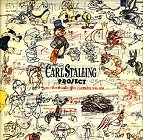 Catalogued, restored, remastered, and released for the first time ever, The Carl Stalling Project is released by Warner Bros. Records. The album is the first-ever release of the original soundtrack recordings from Stalling’s scoring sessions for the Warner Looney Toons and Merrie Melodies cartoons from the 1930s through the 1950s, featuring many of Stalling’s variations on tunes originally written by Raymond Scott (including the famous manic “Powerhouse” cue). Classic cartoon fans snap the album up and demand more.
Catalogued, restored, remastered, and released for the first time ever, The Carl Stalling Project is released by Warner Bros. Records. The album is the first-ever release of the original soundtrack recordings from Stalling’s scoring sessions for the Warner Looney Toons and Merrie Melodies cartoons from the 1930s through the 1950s, featuring many of Stalling’s variations on tunes originally written by Raymond Scott (including the famous manic “Powerhouse” cue). Classic cartoon fans snap the album up and demand more. ![]()
 How can anyone resist the classic sound of the original Looney Toons and Merrie Melodie cartoons? Carl Stalling’s distinctive style changed the way pictures were put to music forever, and created an instantly recognizable repetoire unto itself. You’ve heard a lot of these tracks already, but they were in the background, part of the atmosphere for Bugs, Daffy, Elmer Fudd or Marvin the Martian. But the cues are unmistakable. Most of them do not contain any dialogue and are excellent original recordings, but a few of
How can anyone resist the classic sound of the original Looney Toons and Merrie Melodie cartoons? Carl Stalling’s distinctive style changed the way pictures were put to music forever, and created an instantly recognizable repetoire unto itself. You’ve heard a lot of these tracks already, but they were in the background, part of the atmosphere for Bugs, Daffy, Elmer Fudd or Marvin the Martian. But the cues are unmistakable. Most of them do not contain any dialogue and are excellent original recordings, but a few of  them have the sound effects and character voices intact. My favorites on this album are “Powerhouse and other cuts from the 1950s” and the “Anxiety Montage” – the latter of which contains almost every musical backing for any imaginable exciting situation ever seen in a Bugs Bunny cartoon. This is a must-have!
them have the sound effects and character voices intact. My favorites on this album are “Powerhouse and other cuts from the 1950s” and the “Anxiety Montage” – the latter of which contains almost every musical backing for any imaginable exciting situation ever seen in a Bugs Bunny cartoon. This is a must-have!
- Putty Tat Trouble Part 6 (1:20)
- Hillbilly Hare (4:22)
- Early WB Scores – The Depression Era (6:02)
- The Good Egg (4:25)
- Various Cues from Bugs Bunny Films (5:07)
- There They Go Go Go (5:27)
- Stalling Self-Parody: music from Porky’s Preview (5:26)
- Anxiety Montage (6:11)
- Stalling – The War Years (3:50)
- Medley – Music for a Pack of Hungry Cannibals (5:00)
- Carl Stalling with Milt Franklyn in session (7:14)
- Speedy Gonzalez Meets Two Crows from Tacos (5:33)
- Powerhouse and other cuts from the early 50s (6:15)
- Porky in Wackyland / Dough for the Dodo (5:44)
- To Itch His Own (5:54)
Released by: Warner Bros.
Release date: 1990
Total running time: 77:50
1994 music review by Earl Green
